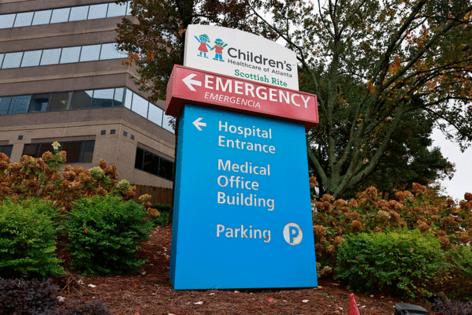Walking pneumonia cases among children up sharply in Georgia and across US
Published in Health & Fitness
ATLANTA — Cases of “walking pneumonia” have been rising sharply in the United States since the spring, especially among young children, according to the Centers for Disease Control and Prevention.
The CDC said it’s closely tracking the recent surge of these infections to better understand any changes in the illnesses since before the pandemic, including any increased severity of infections and any signs of antibiotic resistance.
It’s unclear exactly why the numbers have been on the upswing, but local doctors say it may be influenced by children now in the midst of the school year and possibly lower immunity in children who were not as exposed to the usual childhood infections during the pandemic and home schooling.
Walking pneumonia, a lung infection, is typically caused by the bacteria Mycoplasma pneumoniae. The name was coined because people with pneumonia caused by M. pneumoniae can seem better than expected for someone with a lung infection. With mild symptoms, people may not stay home or in bed, leading to “walking pneumonia.”
Not every walking pneumonia case is tracked by health officials, but surveillance data from the CDC shows a notable increase especially among children between 2 and 4 years old.
In early October, about 7% of emergency room visits among children in this age group were for walking pneumonia, up from 1% in March, according to CDC. The percentage of Mycoplasma pneumonia-related illnesses rose to 7.4%, up from 3.6% for children between the ages of 5 and 17 during this same time period, according to the CDC.
“The increase in children ages 2-4 years is notable because M. pneumoniae historically hasn’t been recognized as a leading cause of pneumonia in this age group,” the CDC said.
Dr. Matthew Linam, pediatric infectious disease specialist at Children’s Healthcare of Atlanta, said the hospital system has seen a similar increase in walking pneumonia infections but said it appears as the though the surge has peaked.
The infection is transmitted from person to person through respiratory droplets during close contact. It has an incubation period that ranges between one to four weeks.
Symptoms include sore throat, cough, headache, mild chills and low-grade fever. Treatment can include antibiotics, but Linam said most recover without the need for antibiotics and it’s rare that children with walking pneumonia would need to be hospitalized.
Walking pneumonia is difficult to detect through standard bacterial cultures. It’s often diagnosed by a physical exam and possibly an X-ray, according to Dr. Thomas Murray, a Yale Medicine pediatric infectious diseases specialist.
Meanwhile, cases of whooping cough, a potentially serious bacterial infection also known as pertussis, are increasing in Georgia and across the country. Nationally, there have been four times as many cases reported this year as were reported by this time last year.
According to the CDC, there have been 18,506 cases around the U.S. as of Oct. 12 — four times higher than the 4,157 reported by this time last year. Georgia has had 160 cases so far this year, up from 50 by this time last year.
The center says whooping cough most commonly affects babies and young children. Infants are at increased risk of serious complications from whooping cough. About half all babies who get whooping cough end up in the hospital, according to the March of Dimes.
People can spread the bacteria through the air by sneezing or coughing and can be infectious from the start of symptoms and for at least two weeks after coughing begins, the CDC reports.
Babies can’t get their first whooping cough vaccine until they are 2 months old. And while most adults were vaccinated as children, the protection wears off over time. That’s why it’s especially important for pregnant women and family members who are around infants to stay current on their whooping cough vaccination, according to Dr. Hugo Scornik, a pediatrician in Conyers and former president of the Georgia chapter of the American Academy of Pediatrics.
--------
©2024 The Atlanta Journal-Constitution. Visit at ajc.com. Distributed by Tribune Content Agency, LLC.










Comments